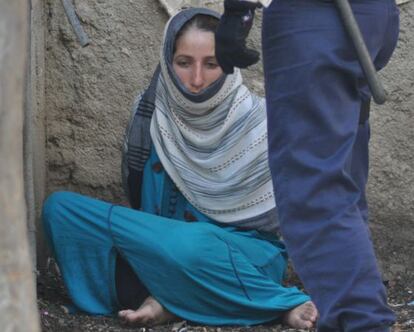The Syrians seeking a safe haven in Spain
Hundreds of war exiles have reached the country after paying mafias for passage The government in Madrid has only granted three people full refugee status


Managing to escape from the Syrian war, which has already claimed over 100,000 lives, guarantees nothing. Especially not if your relatives are still back in Syria. "Don't publish my name. Don't explain who I am or what I do, because they could identify me and go after my loved ones. I was a famous person back home," says a 21-year-old with an athletic body, short hair and a well-kept beard who is wearing a close-fitting navy blue tracksuit and running shoes.
During a conversation of over an hour at the library of the refugee center in the Vallecas district of Madrid, he does not once put down his cellphone. This is his sole remaining link with his mother, whom he speaks of in reverential tones: "She works like three men put together. She adores me. I fled the horror in my country because I don't want my mother to suffer if I die. I have to survive if only for her sake."
Finding Syrian refugees in Spain who are willing to tell their story is no easy job. They are all afraid of Bashar al-Assad's regime. They believe that no borders are secure enough to keep his secret services away. They are not the only ones to think so. Mónica, director of a shelter in Madrid, says that several "odd-looking" people have shown up asking about Syrian refugees with the excuse of helping them out. "We don't know what it is they wanted, but we didn't appreciate the visit."
Ever since the civil war broke out in April 2011, at least 870 Syrian people have requested asylum in Spain. In the last nine months alone, there were nearly 500 petitions, often by families with children arriving at Madrid and Barcelona's airports. Others enter through the Spanish exclaves of Ceuta and Melilla in North Africa after paying hefty fees to the mafias.
Don't mention my name — you could endanger my entire family"
"In some cases we've been told that they paid 33,000 dollars to bring a family over," says Carlos Montero, director of the temporary immigrant holding center (CETI) in Melilla. There are 66 Syrians out of the 870 individuals currently staying at this center, whose maximum capacity is officially 480. This is the largest Syrian group they have had to accommodate since the war broke out.
"Most of them are tradesmen and civil servants. They have money. Some of the children show up with cellphones and tablets. They fly to Egypt or Algeria, and the mafias drive them from there to the [Moroccan] border with fake IDs," explains Montero. "Very few of them request asylum because they know the procedure can take a long time. They would rather have the police treat them in accordance to the Alien Act and begin deportation proceedings."
"They know the Spanish government cannot send them back home because their country is at war," adds María Jesús Vega, of the United Nations' ACNUR refugee agency. "Spain is a springboard; some of them actually want to settle down in other European countries because they have relatives living there."
There are 29 Syrians at the holding center in Ceuta, of whom eight are underage. "They arrive by sea in small vessels from the area of Beliones, 50 meters from our border. They get here in good condition," says the center's director, Carlos Guitard.
Back at the Madrid-Vallecas center, there are 23 other Syrians besides the athletic young man with the cellphone, including eight families with their children. One of the men, a 33-year-old who is wearing a light-blue shirt and flip-flops, spent three months at the Melilla center before being transferred to mainland Spain. He speaks in similar terms as his younger colleague: "Don't mention my name — you could endanger my entire family."
A native of Aleppo, this man says that he was studying in Dubai and that the police took away his passport and his working equipment. He bribed one of his guards and managed to escape. "I traveled from Turkey to Algeria, and in Morocco I paid 1,500 euros for a phony passport. It's very easy. They ask you for a photograph and the money, and you get it in 24 hours. Then they drive you to the border."
From April 2011 to last November, Spain put Syrian asylum petitions on hold"
The "famous" young athlete's trip to Spain was safer. "I traveled to Beirut, where I have some friends. I love that city, it is modern and there is freedom there. To get to the airport I had to go through Hezbollah checkpoints [this group supports the Assad regime] and then I took a direct flight to Madrid, where a friend was waiting for me," he says. He left behind his mother, a successful career and the memories of the horror. "They killed two of my brothers. Another one was taken to jail and he was missing for six months. I have seen black trucks that belong to neither the police nor the army, which shoot at anyone walking down the street. I have been very lucky. Instead of protecting us, the government is killing us."
For 18 months, between April 2011 and November 2012, the Spanish executive put Syrian asylum petitions on hold. It has only granted asylum in three cases, and offered subsidiary protection (a lower status than that of full-fledged refugee) to 61 people. In both cases the petitioners receive work and residency papers, ID cards that show their status, and the same rights as all Spaniards except for voting rights.
Both Syrian refugees who agreed to talk to this newspaper break down when they are asked about their future. "I am not doing well. I can only think about my mother; I can't eat, and when I get angry I get sick," says the younger one, producing a photograph of his sports car, which was wrecked by bombs.
"My thoughts are with my parents and my sister, who are still there," says the other young man. "I cannot afford to have any dreams now. My home is shuttered, my accounts frozen, my working equipment lost."
Tu suscripción se está usando en otro dispositivo
¿Quieres añadir otro usuario a tu suscripción?
Si continúas leyendo en este dispositivo, no se podrá leer en el otro.
FlechaTu suscripción se está usando en otro dispositivo y solo puedes acceder a EL PAÍS desde un dispositivo a la vez.
Si quieres compartir tu cuenta, cambia tu suscripción a la modalidad Premium, así podrás añadir otro usuario. Cada uno accederá con su propia cuenta de email, lo que os permitirá personalizar vuestra experiencia en EL PAÍS.
¿Tienes una suscripción de empresa? Accede aquí para contratar más cuentas.
En el caso de no saber quién está usando tu cuenta, te recomendamos cambiar tu contraseña aquí.
Si decides continuar compartiendo tu cuenta, este mensaje se mostrará en tu dispositivo y en el de la otra persona que está usando tu cuenta de forma indefinida, afectando a tu experiencia de lectura. Puedes consultar aquí los términos y condiciones de la suscripción digital.








































